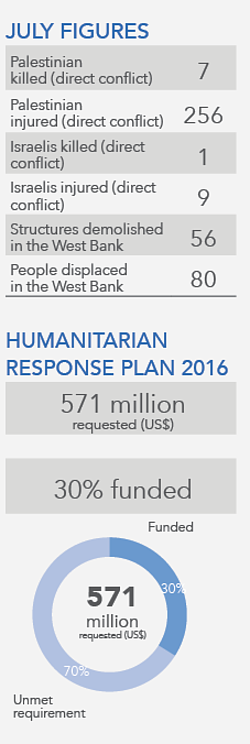Monthly Overview: July 2016
The majority of Palestinian communities in Area C of the West Bank face difficulties in accessing water, with an estimated 180 residential areas not connected to any water network and depending on expensive tankered water to meet their needs. Localities served by the network are also vulnerable to water scarcity, particularly in the summer, a situation exacerbated by a decision in June by the Israeli water company Mekorot to reduce the amount of water pumped to over 150,000 Palestinians in the northern West Bank. This month’s Bulletin profiles a UNICEF-coordinated project to supply subsidized water to 20,000 people in 79 Area C communities, which have an average water consumption of less than 30 litres per capita per day (l/c/d), far below the international standard of 100 l/c/d. The limited access to water is one element of the coercive environment in Area C that increases the risk of forcible transfer.
This month marks the twelfth anniversary of the International Court of Justice (ICJ) Advisory Opinion which stated that the sections of the Barrier which run inside the occupied West Bank, including East Jerusalem, are illegal and should be dismantled. The Bulletin highlights the impact of the Barrier on Palestinian communities in East Jerusalem which are physically separated from the urban centre. Tens of thousands of Palestinians living in these areas face restricted access, a lack of basic services and public infrastructure, unplanned residential construction and lack of law enforcement.
Access to East Jerusalem is also a major concern for the wider Palestinian population, particularly during Ramadan. Since 2008, the Israeli authorities have relaxed permit requirements for Palestinians who hold West Bank ID cards to access the Al Aqsa Mosque for Friday prayers during Ramadan. This year, a total of 300,000 Palestinians who met the aged-based criteria entered East Jerusalem during the four Fridays of Ramadan. However, other announced easings in access restrictions were cancelled, after a fatal attack in Tel Aviv on 8 June, just after Ramadan began, including for the majority of worshippers from the Gaza Strip.
July 2016 marks two years since the seven week escalation of hostilities in Gaza in 2014. One of the most deadly legacies of that escalation is the presence of Explosive Remnants of War (ERW), which continue to pose a serious threat to the civilian population. This month’s Bulletin profiles the work of the UN Mine Action Service (UNMAS), including efforts to clear large aerial bombs, which impede reconstruction and development efforts. To date, UNMAS has cleared sites in more than 40 cases, but 87 sites remain to be cleared.
In his briefing to the Security Council on 12 July, the UN Secretary-General Ban Ki-moon spoke of his recent “moving encounter” with a 15 year-old boy in an UNRWA school in Gaza, who concluded the meeting by saying “harsh restrictions drain away the ambitions of any young person. And this is how we see our future -- to be killed by the conflict, to be killed by the closure, or to be killed by despair.” The Secretary-General expressed the hope that “Surely, we can do better for all the children of Palestine and Israel. Surely, they deserve a horizon of hope.” The Bulletin concludes with a project which aims to offer exactly such hope to the young people of Gaza. UNRWA’s Summer Fun Weeks is currently providing sports and leisure activities in over 120 different locations in Gaza, as part of the Agency’s efforts to support refugee children’s psychosocial needs.










